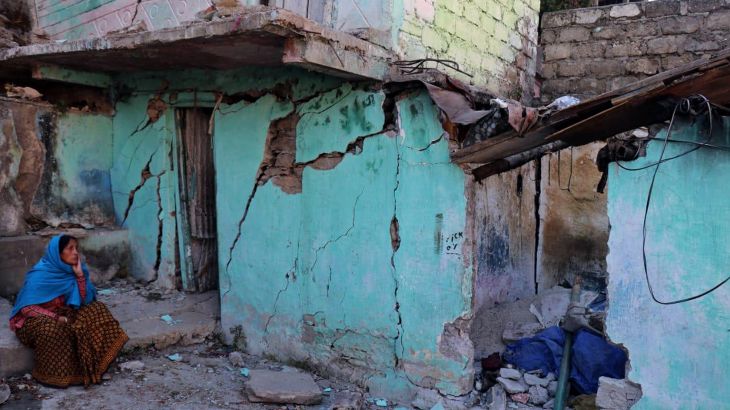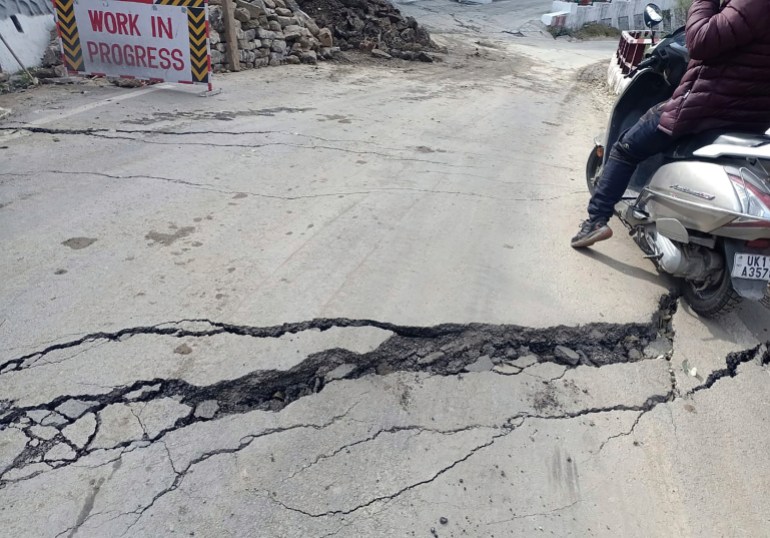Demolitions begin in India’s ‘sinking’ Joshimath, hundreds moved
Authorities will demolish several buildings in the Himalayan town after evacuating families as hundreds of houses develop cracks.

Authorities in a north Indian town are demolishing buildings that had begun to crack due to shifting soil, forcing the evacuation of hundreds of people to safety.
Indian media reports said the demolition drive in Uttarakhand state’s Joshimath began on Tuesday, with authorities dividing the town of 25,000 residents into “danger”, “buffer” and “completely safe” zones.
Keep reading
list of 4 itemsIndia top court stays demolition of over 4,000 homes in Haldwani
Indian, Chinese troops pull back from western Himalayan area
COP27: Are India’s climate pledges a lot of hot air?
A total of 678 buildings in the town – which sits 1,890 metres (6,200 feet) above sea level – have developed cracks, authorities say.

Joshimath, about 490km (305 miles) northeast of the federal capital New Delhi, is a gateway to Hindu and Sikh shrines and is popular with tourists looking to trek parts of the Himalayas. It is also close to India’s border with China.
“It seems 30 per cent of Joshimath is affected. A report is being compiled by an expert committee and it would be submitted to the Prime Minister’s Office,” an official said.
“Basic facilities in the relief camps arranged for the affected people in Joshimath are being constantly inspected by the administration and all possible help is being extended to the affected people,” said Himanshu Khurana, the district magistrate of Chamoli where the town is located.
Meanwhile, India’s Supreme Court on Tuesday declined an urgent hearing on the matter, setting a January 16 date for the next hearing.
“Everything which is important need not come to the apex court,” the court said, according to a report in The Indian Express newspaper.
Authorities start demolition process of two hotels in #Joshimath pic.twitter.com/K2HYamzkRq
— TOI Cities (@TOICitiesNews) January 10, 2023
Experts and residents have long warned that large-scale construction work in and around Joshimath, including for power projects built by companies like the state-run National Thermal Power Corporation (NTPC), could lead to land subsidence.
NTPC, India’s largest power producer, says its tunnelling and other work is not responsible for the cracks in the town.
“There is no way the project is behind the subsistence,” said a government official, adding that NTPC suspended tunnelling work in the area more than two years ago after a boring machine got stuck.
“Blasts in unavoidable circumstances had been carried out miles away from the population and the affected area,” added the official, who sought anonymity in the absence of authorisation to speak to media.
The tunnel concerned was a kilometre distant from the affected area and a kilometre underground, the official added.
Khurana earlier told Reuters that work on some border road projects as well as NTPC’s Tapovan Vishnugad 520 megawatt hydropower plant had been suspended.
“Six structures from across four wards have been found very unsafe,” Khurana told Reuters news agency. “We will demolish some unsafe buildings based on the recommendation and under the guidance of federal experts.”
#WATCH | Joshimath, Uttarakhand: People break down as they leave their homes that have been marked unsafe by the district administration and vacate the areas affected by the Joshimath land subsidence. pic.twitter.com/hr7ZRHCyZK
— ANI UP/Uttarakhand (@ANINewsUP) January 10, 2023
Scientists’ worry over the effect of climate change on the world’s highest mountains was triggered after a 2021 flash flood in the district killed or left missing about 200 people, besides damaging two hydroelectric projects being built. One of them was the NTPC project.
Meanwhile, local resident Prakash Bhutiyal, 50, said seven of the 11 rooms in his residence-cum-guesthouse at Joshimath had developed cracks and they were waiting to be moved to a safer location.
“Our family of nine has been forced to live in just one room,” he said. “We have kept all our belongings in the open. We are yet to be shifted to a safer place.”